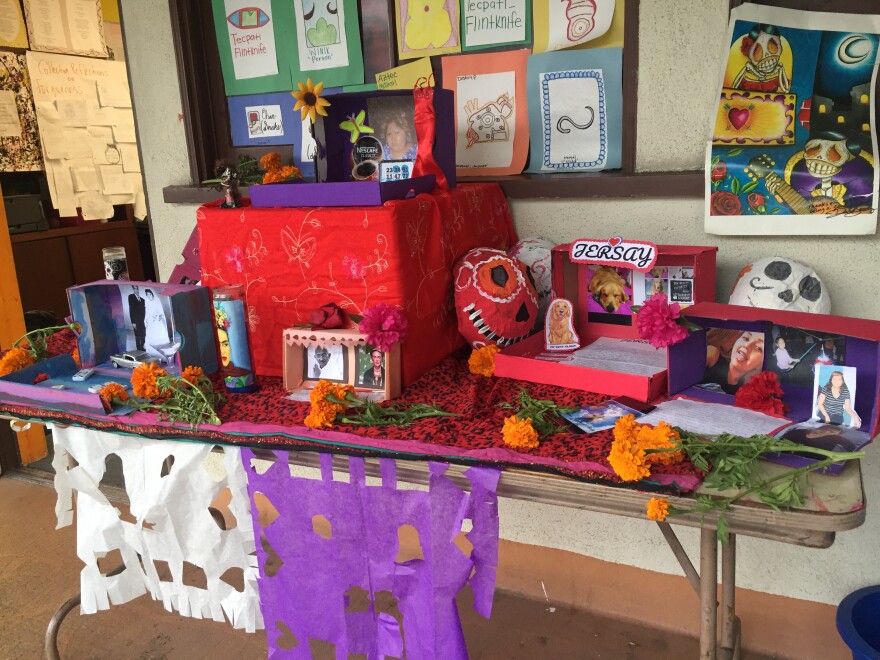This archival content was originally written for and published on KPCC.org. Keep in mind that links and images may no longer work — and references may be outdated.
We asked about your experiences with ethnic studies. Here's what you told us

The California Department of Education is in the process of developing a model ethnic studies curriculum for schools around the state. Meanwhile, a bill has been introduced in the state assembly that, if passed, would require ethnic studies instruction.
It all comes after years of advocacy from educators, community members and youth who believe students should be learning more about the history and culture of various racial and ethnic groups.
Advocates for ethnic studies say the culturally-relevant courses can help students learn about themselves and their communities and get more engaged with academics.
On the other hand, critics of ethnic studies say that the courses have the potential to get too political and point out that requiring yet another course could crowd students' already heavy course-loads.
That's why we wanted to host a KPCC In Person conversation about ethnic studies and the arts.
While the battle over implementation continues, lessons in the spirit of ethnic studies are still being taught in classrooms around Southern California through arts instruction and arts integration.
For example, KPCC brought you to San Gabriel Conservation Corps YouthBuild School in El Monte. For Día de los Muertos, an English teacher there has her students create intricate altars as a way to help them talk about past trauma and to learn about the history behind the tradition and the arts.
Other examples around Southern California include an art teacher who uses tortilla as a canvas for conversations about community, and a Chicano Mural Studies class offered at El Rancho Unified, which claims to be the first district in the state to require ethnic studies for graduation.
https://twitter.com/MrM_ERUSD/status/941758614867402753
To prepare for the event, we asked you, our listeners and readers, what experiences you had, if any, with ethnic studies.
https://twitter.com/KPCCInPerson/status/994008045280620544
Don't see your view reflected here? Become a source, and let us know what you think about ethnic studies and the arts. You can also join the conversation by tweeting @KPCCInPerson.
Ethnic studies classes weren't available to many of you
Krys Molina, who identifies as someone from a mixed background, said ethnic studies wasn't offered when she was in high school, so she sought it out in college:
I took it in college because I want to learn more about the people who share this planet with me. Growing up in Rancho Cucamonga, Los Osos was and may still be very white/Eurocentric.
Deborah Chi went to West High in Torrance. She said her school did not offer ethnic studies when she was there:
As an Asian American, I find the diverse voices/realities would have enriched my worldview as a young adult, but because I had not the access, I really had to do a lot of catching up on how Asians (and other minorities) helped shaped the history of America.
Jackie Hill said an ethnic studies class was actually offered at her school, but she didn't get to take it:
I did not take an ethnic studies class because it was only one class offered and was not offered very often. Also, the class was not required in order to graduate. I wish I had taken an ethnic studies class because I love history and I think ethnic history is missing from traditional history courses in a way that tells the story from a non-Eurocentric point of view.
I took language classes most of middle and high school. I was stuck in the college track and felt I had little room to explore diverse electives. ... I was able to take ethnic studies courses in college and finally felt empowered and proud of my ancestry.
https://twitter.com/Circlesea7/status/986080241364774914
Eduardo Hernandez went to Jurupa Valley High. He said he took a Chicano studies class that helped him attend and graduate from college:
It was a Chicano Studies class. I remember reading literature by Chicano authors and poets. And reading a history book about Mexicans in the US. It affected my life, in that I didn't know there were Mexican or Mexican-American heroes or writers that had prominence in the US. It was eye-opening at the time. It helped my self-esteem a lot.
https://twitter.com/BongBong/status/968926655057076224
Al in Whittier called into AirTalk earlier this year to express surprise in the United States' low rankings in math, English, and science:
We’re pretty far behind … so you know considering our wealth and power and whatnot, I would expect us to be the top five at least. So I think if [ethnic studies] is to be mandated, and valued that highly, I think it could be bundled into a comprehensive AP history course but I think what should be mandated more math and science literacy, especially to account for what kind of job that can get you, regardless, whether you’re latino or white or anything.
